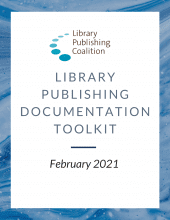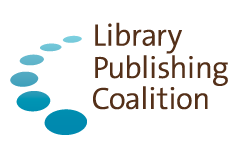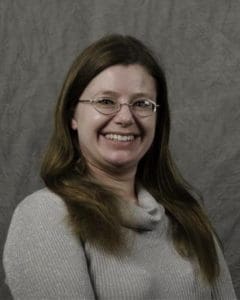January 23, 2023
By Nancy Adams
Transitions is an occasional series where community members reflect on the things they have learned while moving from one institution to another or one role to another.
By Corinne Guimont, Digital Scholarship Coordinator, Virginia Tech Libraries
I have been a part of the Library Publishing community for nearly six years, all of them at Virginia Tech. Before then, however, I spent several years in corporate publishing and archives, during which time I learned a number of valuable lessons that I continue to apply to this day. In this blog, I will talk about some of those lessons and how I believe they have helped me in my career at Virginia Tech.
I received my MIS from the University of Michigan in 2015. After this I took a contract job working on eTextbooks to stay close to family in Michigan. I enjoyed the work and took to it fast. It combined the tech skills I learned in college and graduate school with project management experience I had gained from working on grant projects as a graduate student. I worked on a variety of books and subject matters and was able to see a project through in a short period of time. And yet, despite the positives of this work, I continued to have the nagging feeling that I had earned a masters degree to work in libraries and archives, so after six months in the job, when an opportunity arose to work in corporate archives, I took it.
I spent the next year and a half working on a variety of projects for different corporations, mainly looking at metadata and cataloging. While this work brought me closer to my plan of working in metadata and digital preservation in an academic library, it was still not quite there. Because a number of the projects were private, I could not share my work. I had even signed some non-disclosure agreements. As a result, I began searching for new positions, this time focusing solely on academic institutions. The opportunity at Virginia Tech looked like the perfect fit, it was in an academic library where I could incorporate the publishing and project management skills I had gained since completing my MIS. As an unexpected twist, the position included digital humanities work, which was the focus of my BA.
I had to make a number of cultural adjustments as I transitioned to my position at Virginia Tech. These ranged from simple things like struggling to find a parking place on a college campus to recognizing that taking time during the work day to learn things was in fact “work.” More significantly, however, I soon realized that my new profession—library publishing—was still relatively new to the scene (LPC was founded in 2014), and this had definite implications for how I carried out my work. I’ll offer just two examples.
Workflows. In my previous jobs I was given endless workflows and documentation outlining exactly what I needed to do every step of the way. When I was unsure of the next step, I consulted this documentation and moved forward immediately. My new situation was different. Because Virginia Tech was in the early stage of building its publishing program, and my position itself was new, we had little documentation. While I was able to pull from some resources in the library publishing community, this was all fairly new as well, which meant that we found ourselves having to invent our workflows as we went. On the upside, I found that I had to learn every aspect of a project and had more autonomy over my work. On the downside, it took me longer to get acquainted with my work and to train others.
Deadlines. In my corporate experience a deadline was a deadline, and if I did not meet it, I needed a really good reason as to why. Sales goals might be at stake. In my new role, deadlines were flexible, people were flexible, things were negotiable. I have found pros and cons to this shift. The pros being less stress, more time to work through issues, and more time to experiment with projects and platforms, leading to more creative outcomes in the work we produce. The cons being that a project can go on forever, or at least seem like it. In both cases, the pros significantly outweigh the cons, for me at least, and have helped me grow in my understanding of publishing practices.
I have now been at Virginia Tech for nearly six years. During this time I’ve worked on a variety of projects including open textbooks (e.g. Introduction to Biosystems Engineering) and complex web-based DH projects (e.g. The American Soldier in WWII), and still I find that my corporate experience affects how I approach each and every project. For example, when exploring options for tools and platforms to employ, I look at needs for documentation and how a particular technology might fit into our workflows. Also, when working on a complex DH project that might take years to complete, I try to keep one eye focused on the end product and the other on discrete milestones that can be met throughout the process, such as publishing a dataset or submitting a grant. I’m convinced that my previous experience has contributed to this.
Ultimately, I have found more growth and fulfillment working in the library publishing world than I would have ever found in corporate publishing and archives but feel I have also greatly benefited from that time in my career. Generally speaking, I have found that library publishing allows for more change and experimentation in publications which aligns with my roots in digital humanities and makes it possible for us to build upon our work. Introducing some workflows, however, can make the publication process more predictable which helps for planning and budgeting purposes. As I grow in my career, I’m looking forward to seeing how the library publishing field continues to develop, as I have already seen tremendous growth thanks to initiatives like dedicated documentation month to encourage programs to generate their own documentation.


 To support the community in creating documentation, members of LPC’s Professional Development Committee have created a
To support the community in creating documentation, members of LPC’s Professional Development Committee have created a 

 On behalf of the LPC Board, we are delighted to announce that the recipient of the 2022 LPC Award for Exemplary Service is Angel Peterson, Open Publishing Production Specialist at Penn State University. The Award recognizes substantial contributions by an LPC community member to advancing the mission, vision, and values of the Library Publishing Coalition.
On behalf of the LPC Board, we are delighted to announce that the recipient of the 2022 LPC Award for Exemplary Service is Angel Peterson, Open Publishing Production Specialist at Penn State University. The Award recognizes substantial contributions by an LPC community member to advancing the mission, vision, and values of the Library Publishing Coalition.